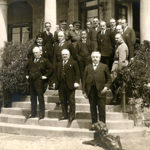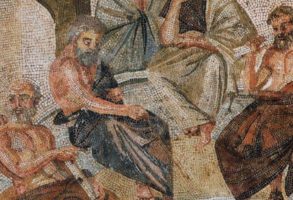
Published March 28, 2022
I am grateful for Academia.edu’s Letters for the invitation to comment on Jeffery Jay Lowder’s paper “Do Euthyphro-Style Dilemmas Provide a Decisive Refutation of Theistic Metaethics DRAFT 2”
Since Lowder prefaces his paper with an autobiographical note beginning, “Hi – Although I am an atheist…,” I feel obliged to follow suit, by noting that I also was an honest-to-God atheist for about ten years after graduating from college, until I concluded that atheism is simply untenable, both logically and empirically.
Regarding the substance of Lowder’s paper, I think that the unremarked gaping hole in all efforts by modern Plato wannabes is to assume that the arguments they lift from Plato’s characteristically too-clever-by-half dialogue Euthyphro—which explicitly presupposes anthropomorphic polytheism—could apply in any form as a refutation of orthodox biblical monotheism. (Euthyphro is too clever by half by posing the apparent dilemma, Is something right because God commands it , or does God command something because it is right?)¹
But since Lowder wisely does not endorse Plato’s dilemma as uniformly valid, I confine myself to observing that the only true dilemma in Lowder’s paper is posed by combining his statement, “I am an atheist” with his article‘s opening sentence, which begins, “In this article, I will define ‘God’ as an all-powerful, all-knowing, and morally perfect being who is worthy of worship.”
Against the notion that God does not exist, I refer Lowder, first of all, not to Thomas Aquinas and but to Thomas Paine: “[E]verything we behold carries in itself the internal evidence that it did not make itself. . . .[A]nd it is the conviction arising from this evidence, that carries us on, as it were, by necessity, to the belief of a first cause eternally existing, of a nature totally different to any material existence we know of, and by the power of which all things exist, and this first cause man calls God.”²
“Everything we behold” obviously included Plato and includes Lowder himself, who, like the 14-billion-year-old (give or take) universe in which we all live, carry in themselves internal evidence that they did not make themselves.
How then does Lowder account for his own undoubted existence? And if, in his words, “I will define ‘God’ as an all-powerful, all-knowing, and morally perfect being who is worthy of worship,” the natural question is: Why then doesn’t Lowder worship Him?
Dear Jeffery,
Many thanks for your defense of atheism, which I found very interesting but unconvincing.
Let’s review the score:³
| Time | Universes |
| (t = 0) | 0 |
| (t > 0) | 1 |
The evidence favors Creation. All you have offered is the unsupported and unsupportable assertion that God cannot exist or create a universe because you say so. But the empirical evidence suggests that he does and did.
All the best,
John
Jeffery Lowder’s Final Reply:
¹ Plato has posed a false dilemma. Only the second horn is valid: A good God commands only good, not evil. If you commit evil (say, bombing the World Trade Center) because you think God told you to, the fault is yours, not God’s. al-Ghazali (1058-1111) took this position in The Incoherence of the Philosophers. Translated by Michael E. Marmura. Provo Utah, 2000. But to treat both horns as equally valid perpetuates an error that rationalizes evil.
² Editor Philip S. Foner, The Complete Writings of Thomas Paine, vol. I, 460; retrieved 21 March 2022 from http://mises.org/books/paine1.pdf.
³ https://en.wikipedia.org/wiki/Big_Bang
John D. Mueller is the Lehrman Institute Fellow in Economics and Director of the Economics and Ethics Program at the Ethics and Public Policy Center.
Photo by Michael Kroul on Unsplash
John D. Mueller is the Lehrman Institute Fellow in Economics and Director of the Economics and Ethics Program at the Ethics and Public Policy Center. Mr. Mueller specializes in the relation of modern economic theory to its Judeo-Christian and Greco-Roman origins, its practical application to personal, family, and political economy, and the interaction of economics, philosophical worldviews, and religious faith. He is also an adjunct senior research fellow at the Social Futuring Center.












